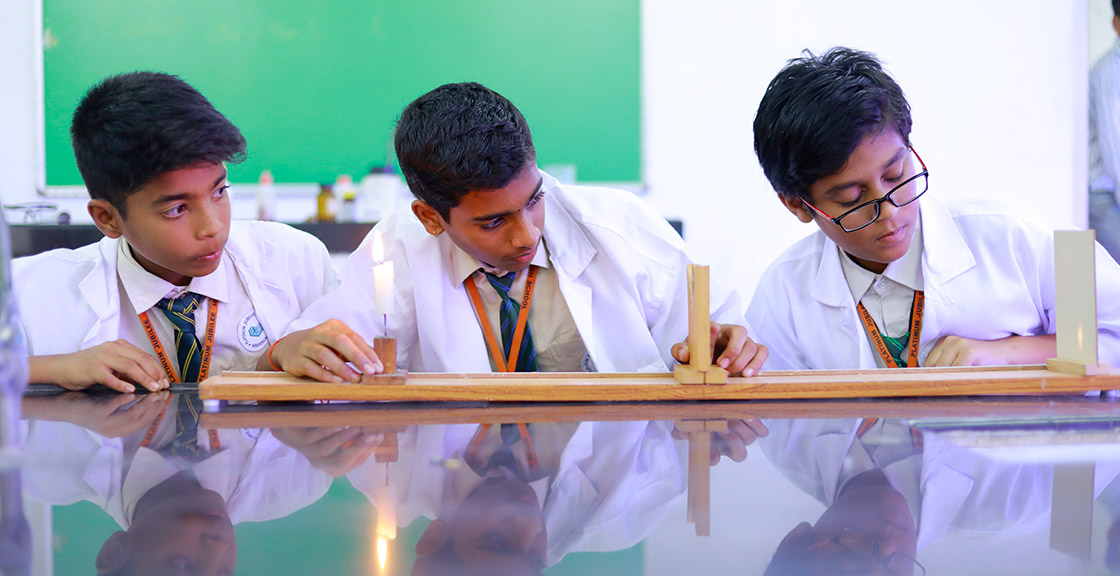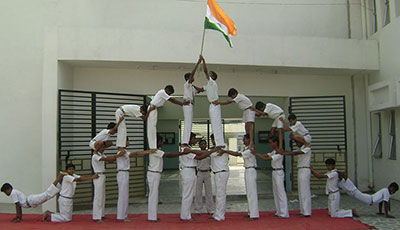
The curriculum across the Pre-Primary, Primary and Secondary Sections is interconnected and designed to ensure the holistic development of students. This integrated curriculum is supplemented by numerous activities, field trips and class projects.
Platinum Jubilee High School, Warangal (PJHSW) follows a learner-centred pedagogy using Howard Gardner's Theory of Multiple Intelligences. This integrated learning approach caters to every child's learning style and strengths. Our teachers also use Bloom's Taxonomy to help students develop deep thinking skills.
Research shows that high quality experiences in the early years are linked to positive outcomes associated with health, social and economic wellbeing as adults and that 90% of brain development occurs during the first five years of a child's life. PJHSW's pre-primary programme provides ongoing training and support for teachers to facilitate the provision of safe, stimulating and nurturing early learning environments for young children.
PJHSW's pre-primary curriculum promotes holistic learning through a progressive, well-researched methodology of Shishu Pahel Padhati (SPP). SPP is a child-centred pedagogy and means ‘child first'. It encourages children to plan and construct their own learning, thus retaining their natural self-confidence and developing knowledge, skills, values and attitudes for their current and future needs. SPP focuses on experiential learning through hands-on activities that include opportunities to explore, experience, practice, reflect and share learnings. Our teachers plan and implement an engaging curriculum based on this theory to meet meaningful goals, while also being mindful of differentiation and diversity. The Pre-Primary Section follows a teacher-student ratio of 1:15.
PJHSW's Primary Section provides a high quality curriculum that embraces intellectual, social, physical, artistic and emotional learning, underpinned by moral values and at an affordable fee. The natural curiosity and creativity of a child is nurtured through application-based learning methods. The syllabus is planned to facilitate learning in students where each child is given the best learning experience. Our teachers plan and design Curriculum Webs to ensure that every topic in the curriculum is integrated with other subjects.

At the Secondary level, the Telangana state-prescribed curriculum is taught using innovative methods and activities. Lessons are supplemented with a variety of extra-curricular activities, field trips and class projects. Students also participate in a number of interschool activities such as elocution competitions, debates, science exhibitions, creative writing and the arts. Our students learn through collective reflections shared with peers and facilitators and group discussions.
PJHSW provides many initiatives to support quality academic, experiential and peer-to-peer learning.
Atal Tinkering Lab (ATL)
PJHSW is the first school in Warangal to establish an ATL, a Central Government of India initiative to encourage scientific thinking, innovation and creativity among students. In the ATL, students are given hands-on experience working with basic electronics, such as Arduino boards, printed circuit boards, microcontrollers, sensors, actuators and fundamental mechanical tools and kits. Students are also taught how to use Raspberry Pi computers and Python and Scratch coding languages to develop their own digital gaming applications. PJHSW was selected as the ATL School of the Month five times within 10 months of launching the ATL. PJHSW students participated in the Interschool ATL Fest 2019, which engaged with more than 300 students from 22 schools and eight different districts and featured an exhibition of students' projects. During the Interschool ATL Fest 2019, PJHSW students:
Foundation Classes for Engineering (FEM)
Foundation engineering classes are offered for students in Grades 6 to 10 to gain advanced skills and enhanced academic knowledge. It has led to students' increased interest in engineering and improved their outcomes in competitive exams.
Innovative Scientific Analytic Research and Development (ISARD)
PJHSW students participate in ISARD, an annual science fair at the school district level. Since 2016, ISARD has reached 100 schools and more than 500 students. PJHSW students also take part in external science fairs and exhibitions, including Inspire and the Jawaharlal Nehru National Science, Mathematics and Environment Exhibition (JNNSMEE).
Library and Reading Programmes
PJHSW's library and reading programmes go beyond books. Combined with general knowledge classes, they include TED Talks, Meet the Author programmes, debates, and language and vocabulary games. Each student receives a monthly magazine that builds their general knowledge, English, maths and science comprehension and vocabulary skills. The Scholastic Reading Programme has also been introduced for Grades 1 to 8. Our teachers also have a reading programme where they share books and articles with each other.
Robotics Programme
PJHSW's robotics programme looks at the design, construction, operation and use of robots, as well as computer systems for their sensory feedback and information processing. Robotics classes support and strengthen students' knowledge and skills and helps them to apply this understanding while designing, creating and operating robots.
Vedic Maths and Abacus
Many students have improved their speed and accuracy when solving maths problems since Vedic maths was introduced in 2017. Our primary classes have also improved their mathematical skills since the introduction of Abacus classes in 2016.
Arts
PJHSW's students are given a platform to express their creativity and showcase their talents and skills in various dance, art and singing competitions.
Field Trips and Excursions
Regular field trips are arranged to places of educational interest in and around the city. These visits are related to classroom topics and are an effective way of reinforcing learning. Students look forward to these field trips and share their learnings through essays, reports, drawings and projects.
Camps
PJHSW offers a broad range of camps, from one-day picnics to overnight camps lasting seven to eight days. The camp objectives are well defined and seek to teach specific life skills and provide children with invaluable lessons and fun.

The Physical Education (PE) department works all year round to provide opportunities for students to practice sports and participate in competitions. Our students have regular games and PE periods through the week where they practice yoga and other exercises.
Students also learn about the rules of various sports. Sports include throwball, football, volleyball, kho-kho, kabaddi, table tennis and badminton. They also work on their cognitive skills through playing carom and chess.
Our students participate in many interschool competitions for sports. Year after year, our students are selected as national players, making PJHSW and their families proud.
Education today is constantly evolving. In an effort to keep up to date with the changes in the educational field and to challenge students, PJHSW participates in internal and external Olympiads for English, mathematics, science and IT.
These are held with support from organisations including the Science Olympiad Foundation (SOF), Unified Council, National Teachers Council, Ignited Mind Lab, Spell Bee, Neltas, Mastermind and the All India School Science Teachers Association (AISSTA). Many of our talented students go on to qualify for the zonal and national levels.
Dance
Students participate in aerobics, Zumba and various national and international dance forms.
Art Programme
Art is taught in conjunction with other subjects such as social science, science and mathematics. Our Secondary students are encouraged to compete in interschool art competitions. They are also guided to take elementary and intermediate art exams.
Annual Musicals
Our Primary and Secondary students eagerly look forward to PJHSW's annual plays, from The Wizard of Oz and Aladdin to Romeo and Juliet and Hamlet. The plays are scripted and adapted by our teachers and every part of the production is managed by our talented teachers, parents and students.
Class Assemblies
This weekly event brings Primary and Secondary students together, promoting a sense of oneness and family.
Special Days
PJHSW seeks to boost students' knowledge by learning about and celebrating special days. Navratri, Eid, Christmas, World Environment Day and even No Bag Day are some of the days we celebrate. Days such as Hindi Divas are celebrated with plays and inter-house competitions, with the aim of appreciating our national language.
Our qualified and experienced multi-lingual staff nurture and provide care to students.
PJHSW has spacious classrooms with abundant natural light, outdoor play areas, a well-stocked library and a large indoor gym area. A happy, safe and engaging learning space has been designed to provide an enriching environment for young learners that includes:

© Aga Khan Schools 2009 - All rights reserved
Terms & Conditions | Privacy Policy
The Aga Khan Schools are part of the Aga Khan Education Services,
an agency of the Aga Khan Development Network
© Aga Khan Schools 2009 - All rights reserved | Terms & Conditions | Privacy Policy
The Aga Khan Schools are part of the Aga Khan Education Services,
an agency of the Aga Khan Development Network